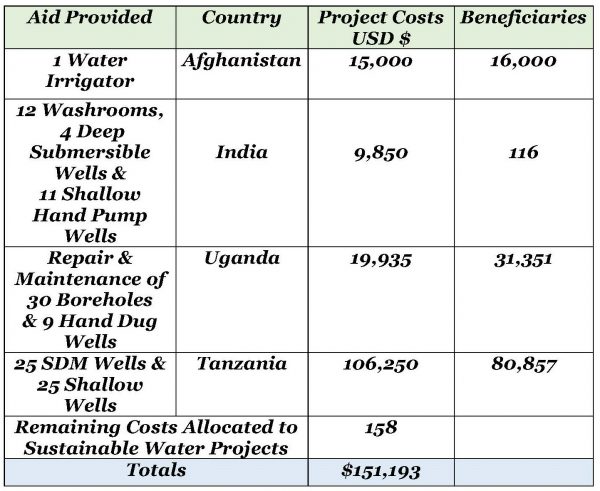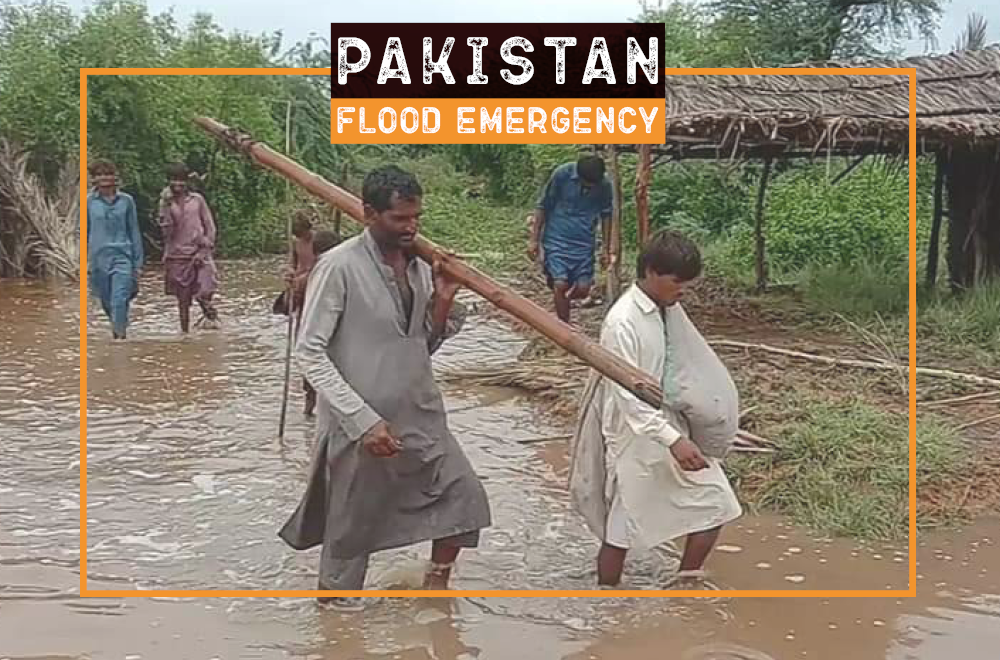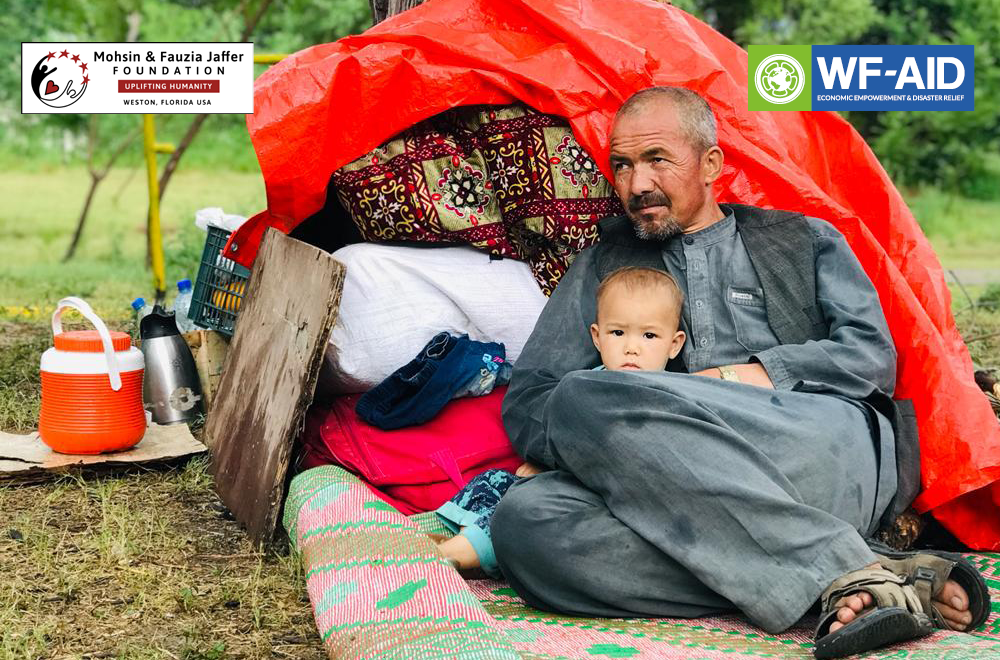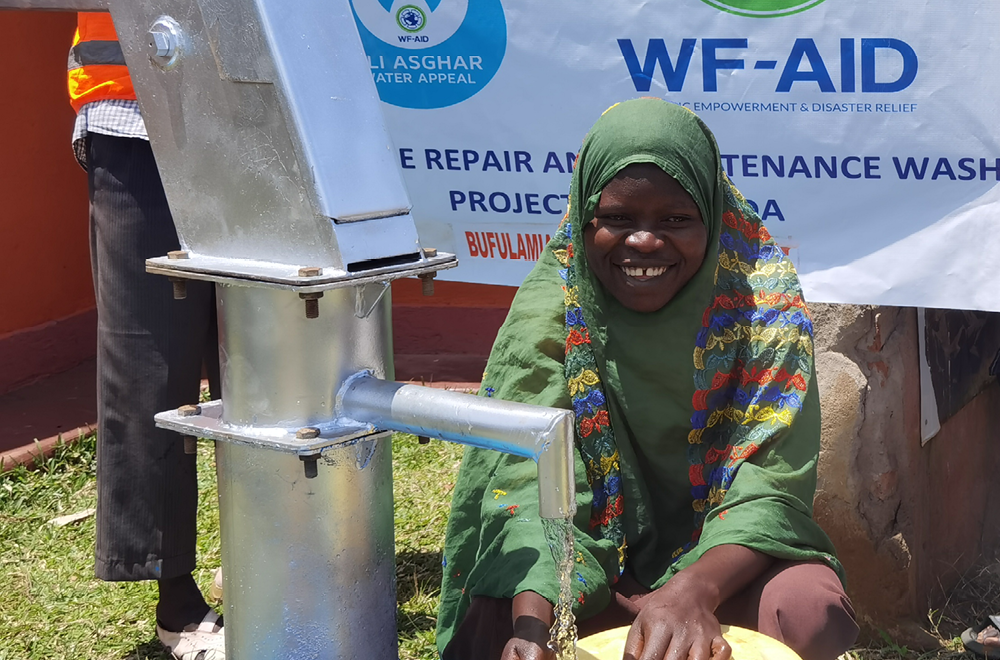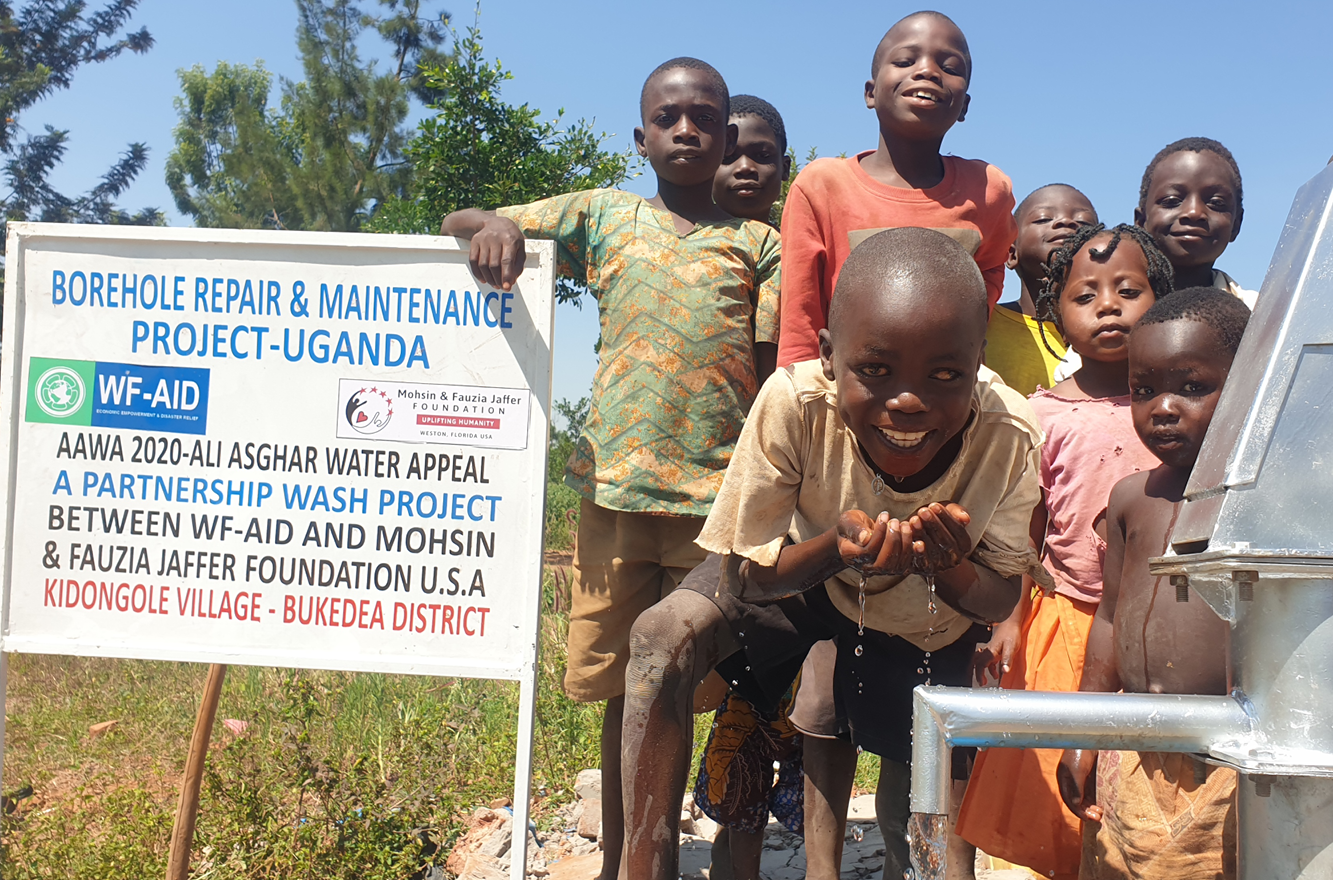

WF-AID would like to extend our deepest gratitude to the Mohsin & Fauzia Jaffer Foundation, USA for their generous donation of USD
$151,193 which successfully provided essential and sustainable water relief across Uganda, Tanzania, India and Afghanistan.
Your donation funded four Ali Asghar Water Appeal projects:
- The installation of one water irrigation system in Afghanistan.
- The construction of 12 washrooms, 4 submersible deep wells, and 11 hand pump shallow wells in India.
- The repair of 30 boreholes and the construction of 9 water wells across Uganda.
- The construction of 25 deep wells and 25 shallow wells across Tanzania.
The projects commenced in 2020 and were completed in 2022. This report provides a complete comprehensive breakdown of the projects funded over the past 2 years with qualitative and quantitative insight on the impact of your contribution.
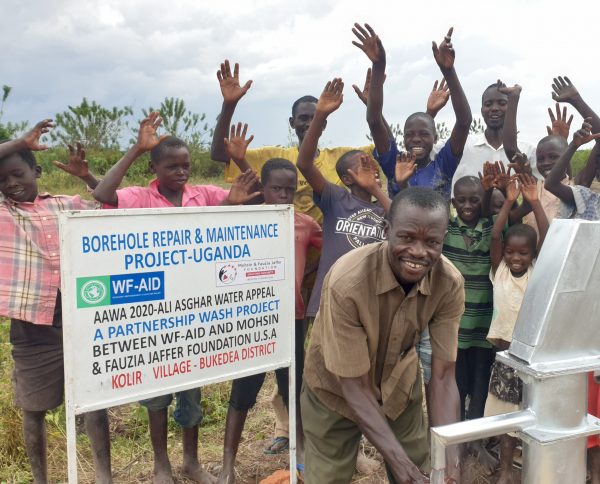
Afghanistan
AFGHANISTAN
LOCATION & BACKGROUND
One water irrigation was dug in the village of Rezishk in the area of Hasabab. This is situated in the District of Indjil in Herat Province.
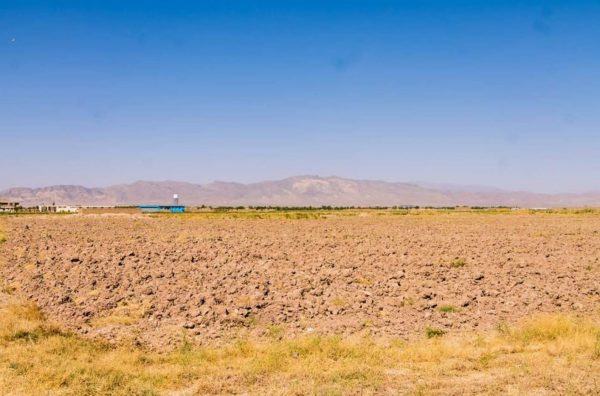
The arid lands of the Herat Province has caused farmers immense difficulties. Due to the water access restrictions, farmers are unable to grow and harvest their crops, and often many go hungry. Families in Afghanistan mostly live in joint family units of 12-16 members per household. Due to the dry conditions, they often have to travel a great distance of 5kms to access clean water for their families.
PROJECT AIMS
The aim of this project was not only to provide clean water to the all in the nearby village citizens but to also provide water access to farmers in the village to irrigate their farms. This provides long-term sustainable subsidies for the farmers as the water supplies their land with crops, generating a disposable income for the families.
This project focused on providing aid to the Shia population of the Hilman District in Afghanistan, where the population is currently predominantly Sunni. 52 years back these families migrated to Rezishk in the village of Hasanabad to safeguard from the atrocities they were facing in Hilman. They bought the land when they migrated to Hasanabad. During that time, the land was not dry and was quite cheap to purchase. Over the course of the years, the land in the area became dry and nothing grew on it as the water dried up across the area.
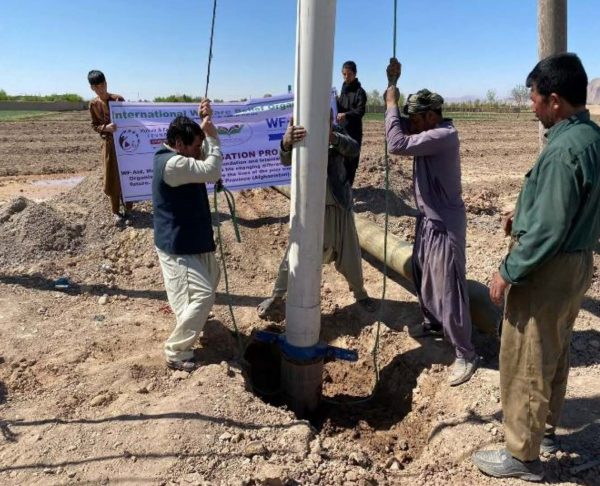
PROCESS
The water irrigator is powered by a motor where the drilling is done 150- 160 meters into the ground. Water is pumped out through a 9” tube through a diesel-powered motor which pulls water out of the ground and travels through a man-made river. This river has several diversions leading towards farms from where farmers are able to irrigate their farms.
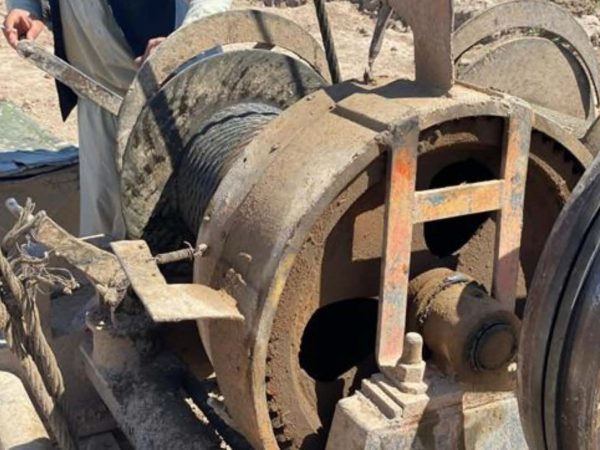
PROJECT IMPACT
This project provided about 14,000 families (with average of 12 and to 16 members per family) with clean water to cook, drink, & wash a daily basis.
It also supports the irrigation of 300 farmers per day, and 520 farmers per month.
BENEFICIARIES
Your generous donation provided a total of 16,000 beneficiaries with access to clean water, as well as supplied farmers with water for their farms.
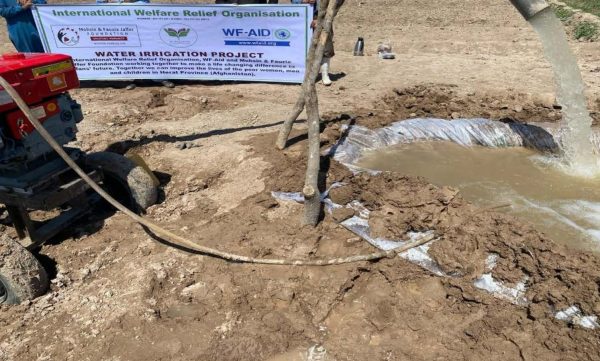
The table below provides insight into the beneficiaries reached through this project:

FINANCIAL BREAKDOWN
WF-AID thanks The Mohsin & Fauzia Jaffer Foundation USA for their generous contribution of USD $15,000 which provided a total of 16,000 beneficiaries with clean water, including supplying farmers with water.
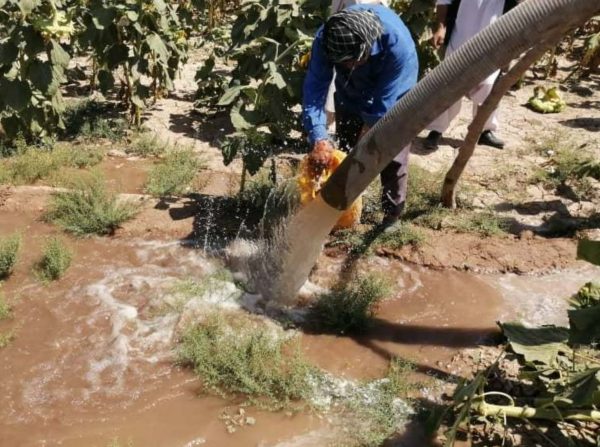
The table below portrays the breakdown of the project cost:

BENEFICIARY STORY
A.R’s Family
The family of AR and her husband are both disabled, struggling to provide for their 4 girls and 4 boys. Two boys are married and each have 5, and 4 children. Due to their land being dry, the were not able to work their land to harvest crops. Therefore, they used to work at other people’s farm to earn a small income in an attempt to provide for the many hungry mouths of their family.
After the water irrigation started to provide water into their farm, they now work on their own farm and they grow wheat, corn, sunflower, cotton and all sorts of vegetables that can grow in the season. They had bought seeds on credit and had to hire a tractor to start their harvest which was also taken on credit and the payment would be given in wheat once it would be harvested.
Once they harvested the wheat, they were able to repay all the debt they had taken to start farming and still have wheat they will sell in the market to get cash. They also sell all the vegetables they have grown in the farm for cash to buy salt, tea, lentils, rice, oil to use for the family They are financially much better and will have enough resources to by the seeds for the next harvest. Hence, the water irrigation project has improved their standard of living as well as provide a sustainable income for the family.
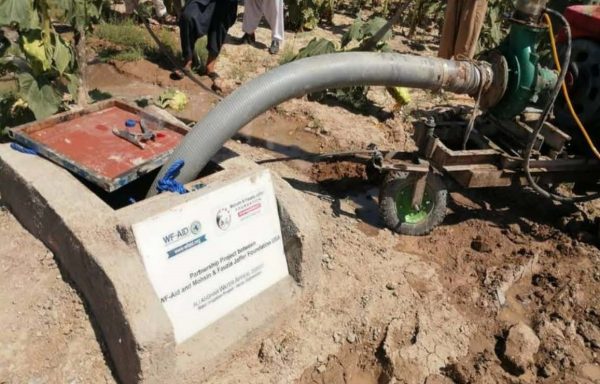
TESTIMONIALS
After the water irrigator was in place, we were sent a letter from a group of beneficiaries who live in the Rezishk village who wanted to extend their gratitude for the way that this project has improved their standard of living. This group consists of around 1000 widowed mothers and their families who benefited from water irrigation project in their farms for the first and second farming seasons. The below statement details their personal gratitude:
‘Due to the water aridity in most areas, we had lost our hope that we never could do our farming in order to get product from our farm. After the excavation of the well, we could do the farming and had good product like wheat, barley and some other cultivation in the first season of this year as well as the second season.’
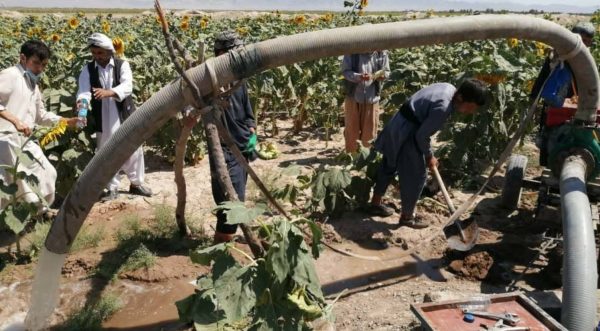
‘Due to the water aridity in most areas, we had lost our hope that we never could do our farming in order to get product from our farm. After the excavation of the well, we could do the farming and had good product like wheat, barley and some other cultivation in the first season of this year as well as the second season.’
SUMMARY
Your generous contribution of USD $15,000 provided a total of 16,000 beneficiaries with clean water, including supplying farmers with water.
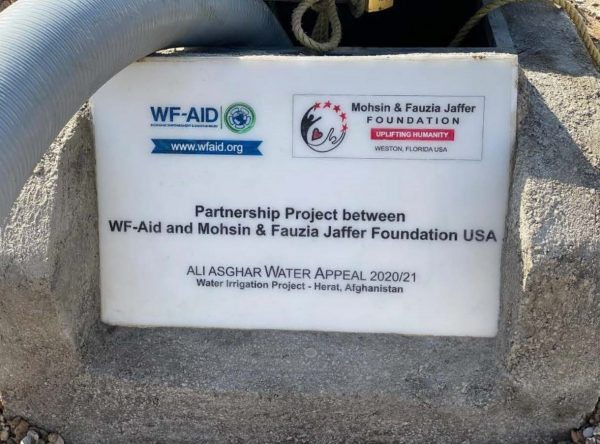

India
INDIA
LOCATION & BACKGROUND
A total of 12 washrooms, 4 Deep Submersible Wells, and 11 Hand Pump Shallow Wells were constructed across 8 locations in India.
The below table provides a breakdown of each well or washroom constructed at each location:
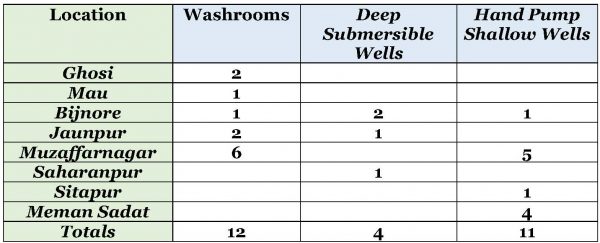
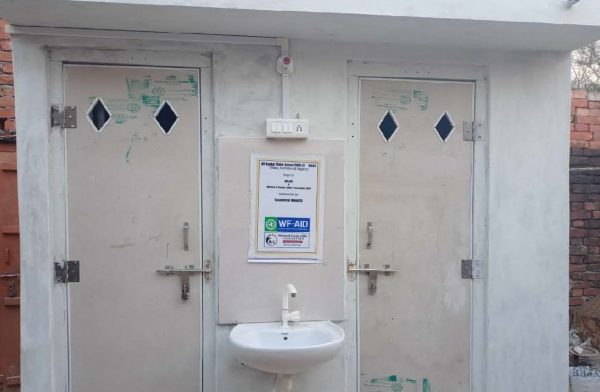
With a growing population and the poor socio-economic conditions in India, many children and families do not have access to sanitary washrooms close to their homes. This leaves them with two options; to either travel a long distance to reach the closest washroom, or to relieve themselves in public places. Both of these options bring with them great factors of danger and suffering.
In our intersectional research into the WASH programmes and the evidence of Gender Based Violence in deprived areas, we have observed that areas where children and young girls have to travel to distant washrooms, or relieve themselves in public places, have a higher risk of experiencing rape or sexual abuse. This is especially significant during the time of night, when children have to walk to the nearest washroom where they are followed, or obliged to expose themselves in a vulnerable state to relieve themselves in an unsheltered and unsafe location. Therefore, the deprivation of a simple washroom facility exposes many children to wider dangers and life-altering consequences.
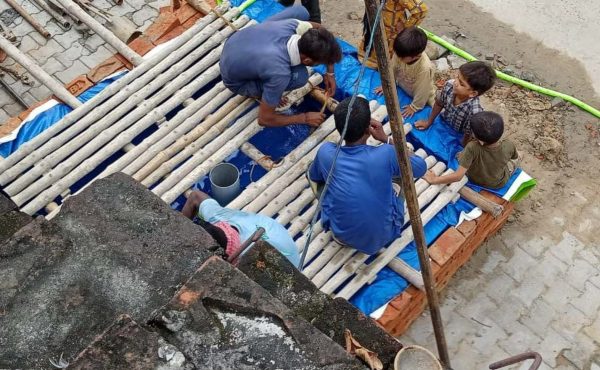
PROJECT AIMS
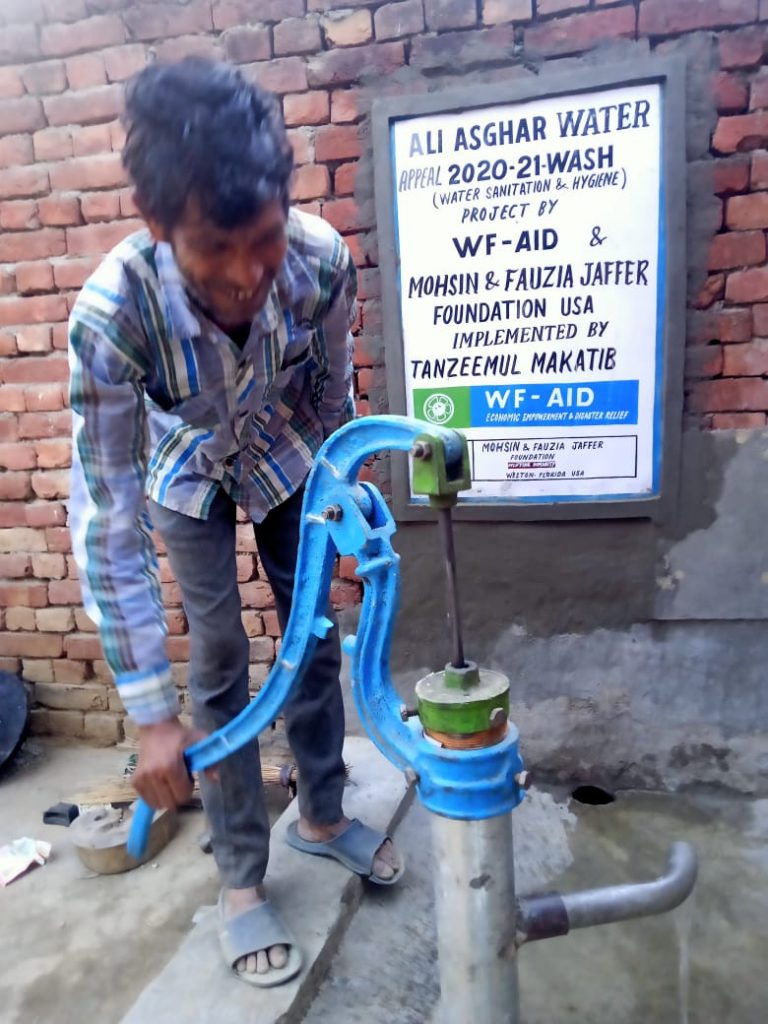
Consequently, our focus on delivering safe, sustainable and efficient washrooms to the families across the 8 locations provides aid through a multifaceted impact, contributing towards increasing the overall standard of living for those in need.
Your generous donation has contributed towards reducing the danger that many women and children face in regards to using washrooms by funding 12 washrooms that are strategically located close to the homes of the families in need. Our ground agents have ensured that the washrooms are located in private yet safe locations, with secure locks that ensure the privacy and safety of the users.
The 15 water wells (4 deep submersible and 11 shallow hand pump wells) furthermore relieve these women and young children from having to travel to unsafe remote locations to precure water.
PROJECT IMPACT
This project provided 15 wells (4 deep submersible and 11 shallow hand pump wells) which supplies a total of 116 beneficiaries per day with clean water to cook, drink, & wash.
This project also provided 12 safe and hygienic washroom facilities to a total of 70 beneficiaries per day
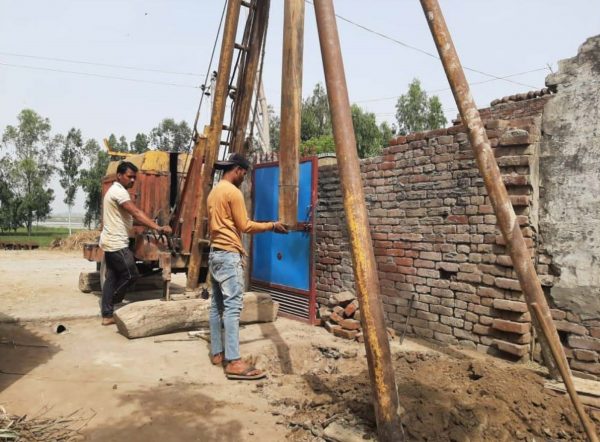
BENEFICIARIES
Your generous donation provided a total of 186 beneficiaries per day with access to clean water and safe washroom facilities.
FINANCIAL BREAKDOWN
Your generous contribution of USD $9850 which provided a total of 186 beneficiaries with washroom facilities and clean water on a daily basis.
The table below provides a financial overview of this project:

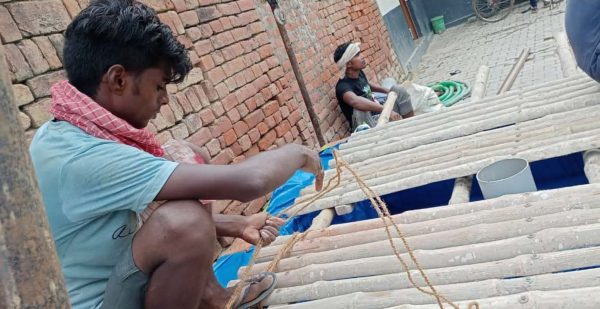
The table below provides a breakdown of the beneficiaries from the 12 washrooms constructed across India:
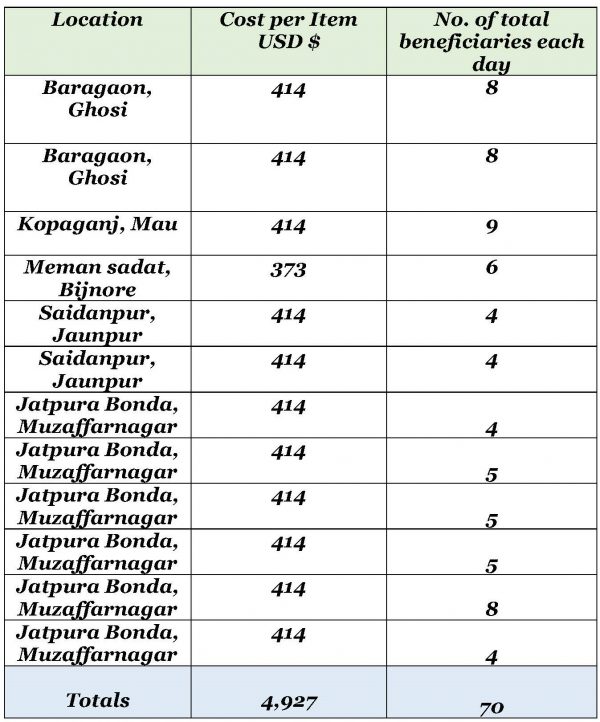
The table below provides a breakdown of the beneficiaries from the 4 Deep Submersible Wells constructed across India:
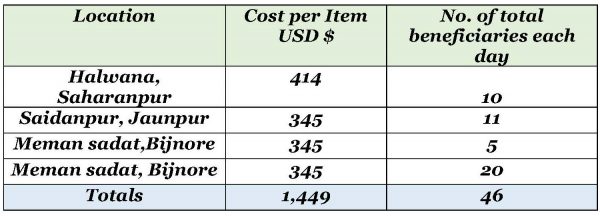
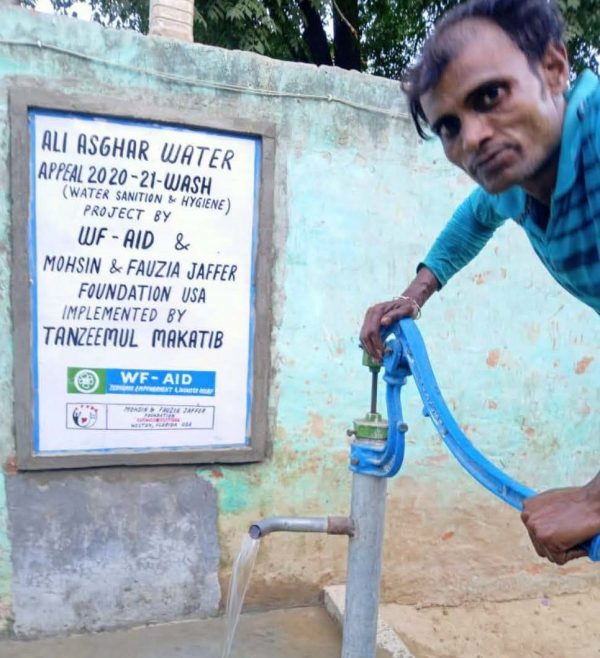
The table below provides a breakdown of the beneficiaries from the 11 Shallow Hand Pump Wells constructed across India:
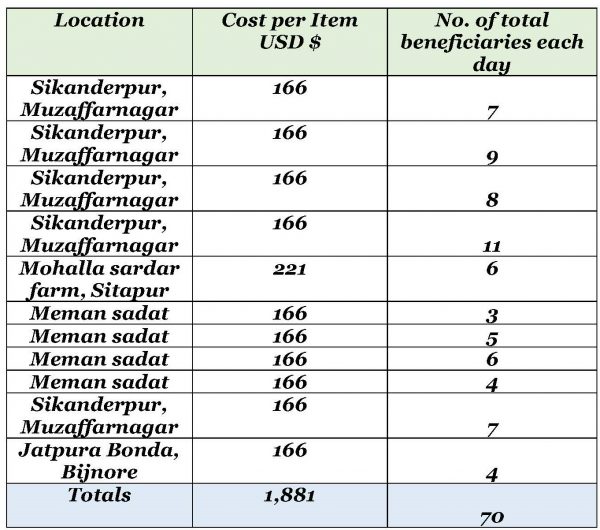
Hence $4,927 of your generous contribution was spent to construct 12 washroom facilities, $1,449 was utilised to construct 4 Deep Submersible Wells and $1,881 was used to construct 11 Shallow Hand Pump Wells across 8 locations in India.
BENEFICIARY STORY
M.S’s Family
M.S is an 18 year old boy. His father died a few years ago due to heart attack, leaving him, his mother and his 3 siblings without any caretaker. Before this project, the young boys and their mother had to procure water from their neighbour’s hand pump and would haul the buckets across the distance back to their home. This was adversely affecting their health.
This project provided M.S’s family a brand new hand pump was installed in their premises, thus ending their previous difficulties to collect water from someone else’s house.
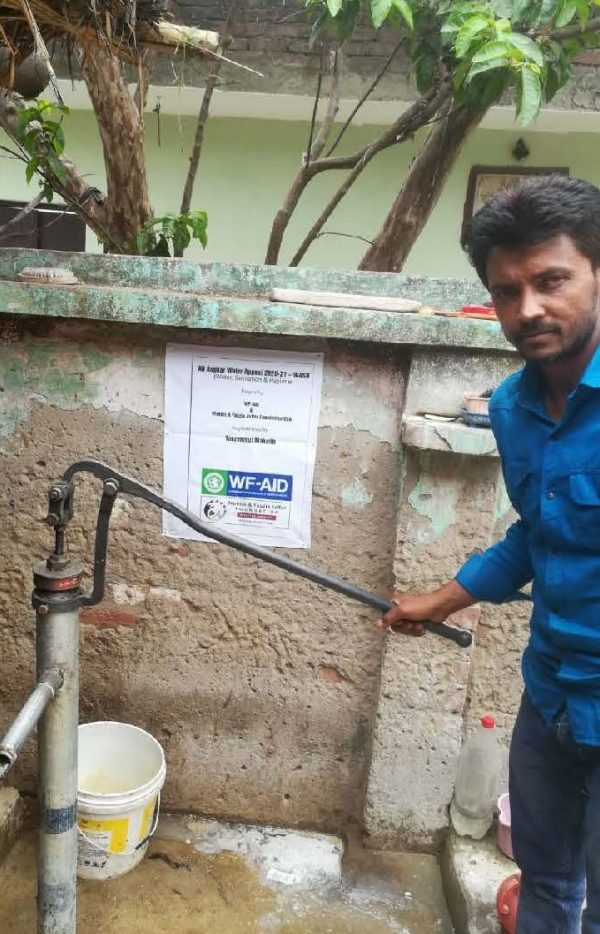
SUMMARY
Your generous contribution of USD $9,850 provided a total of 186 beneficiaries with washroom facilities and access to clean water on a daily basis.

Uganda
UGANDA
LOCATION & BACKGROUND
This initiative involved the installation of water wells and a repair & maintenance programme for boreholes across three districts in Eastern Uganda, where access to clean, safe drinking water was severely limited.
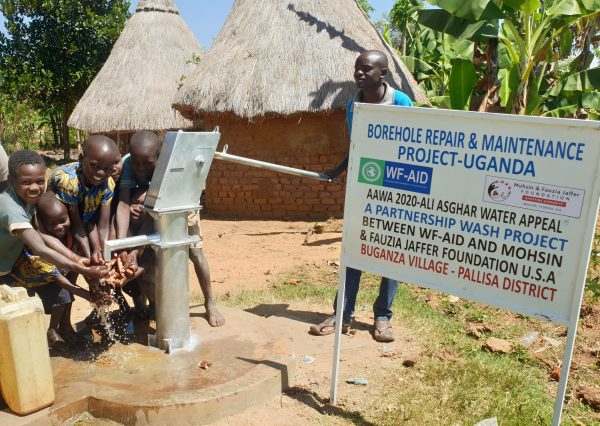
Our ground agency conducted a thorough needs analysis which found that a lack of adequate infrastructure made access to clean water extremely difficult in the scouted areas and had forced the local populace to fetch water from unprotected wells, streams, ponds and still water – which had been causing several waterborne diseases.
They had also noted the severity of the risks posed to girls who fetch water, based on the existing gender roles in this part of the developing world where the burden of responsibility of fetching water is on women and girls. Furthermore, they had found that the average time consumed for fetching water is 4-5 hours per trip, with 2-3 trips per day not being uncommon. Having clean water readily available in a village results in the time consumed in searching for water being converted to other more productive activities, especially in the case of girls having more time in education and in income generating activities. There are also numerous indirect benefits to a water programme such as this, including the increase of healthiness amongst the population (due to a reduced chance of contaminating waterborne diseases) as well as boosting agricultural activities.
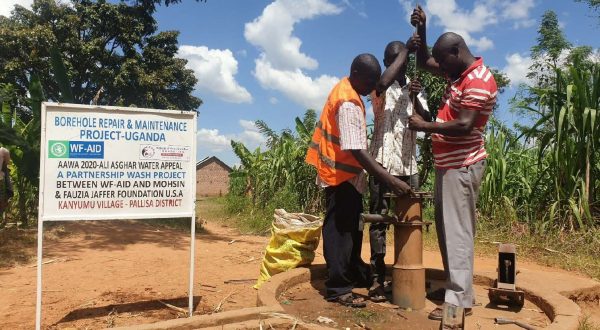
PROCESS & PROJECT IMPACT
-
Water Well Installation
One aspect of the project involved digging and installing hand-dug wells in nine villages across the three districts of Bukedea, Kibuku and Pallisa, in Eastern Uganda. These areas were targeted through the needs analysis due to inadequate government funding for villages with low infrastructure levels and their remoteness.
The hand dug wells supplement the existing water sources, such as local wells and boreholes, and are a traditional method of obtaining groundwater in the developing world. The wells are lined with concrete cylinders to prevent pollution or disintegration, as well as a drainage channel to prevent waste water seeping back into the well.
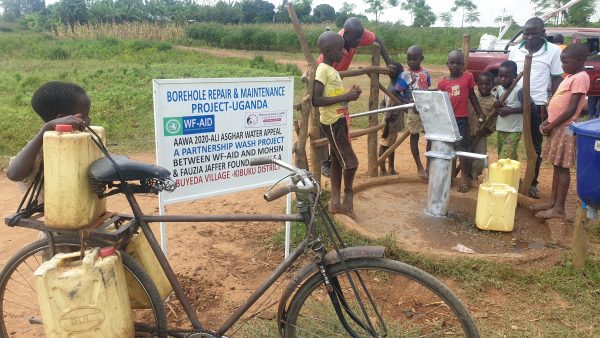
Upon receipt of the funds, the project underwent the following stages:
- Project initiation meeting with stakeholders and preparation of the work plan:
- Site visit and inspection of the boreholes to determine the parts to be installed for repair, and assessment of areas to install the hand dug
- Selection of vendors and procurement of
- Selection of local contractors to implement the
- Monitoring, supervision and training of village health teams on sanitation, usage and maintenance.
- Compilation of
As noted on point 4, the project involved training water supply caretakers and village health teams per parish. These trained teams form a steering committee on water facilities and health-related problems in the local community. This enhances the sustainability element of the project, which builds the capacity of village health teams and households in water maintenance, sanitation and good hygiene practices
2. Borehole Repair & Maintenance
The other aspect of this project involved repairing 30 existing boreholes, 10 in each district of Bukedea, Pallisa and Kibuku.
These existing boreholes had become impractical for use due to spoiled parts such as pipes, rods, valves, pedestals, head assemblies and cylinders – yet had the possibility of functioning as a new borehole once properly repaired and maintained. This is the most efficient manner of preserving an existing borehole well, which has the ability to produce clean water for several years.
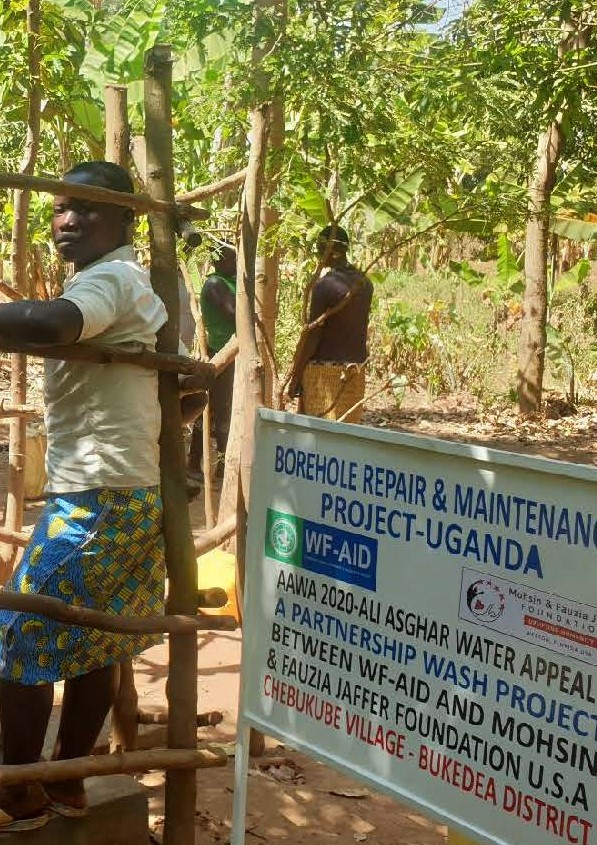
BENEFICIARIES
Each water well constructed serves at least 100 different families, totalling 1,280 families (5,760 beneficiaries) for all nine villages, which the table below summarises:
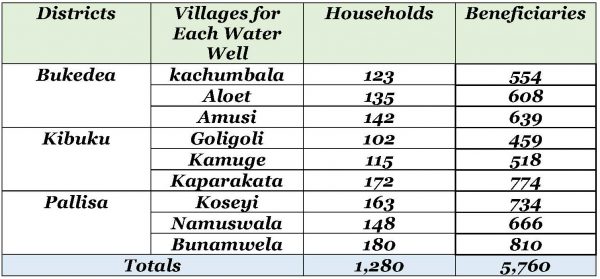
The number of individuals benefitting from the repaired boreholes in each village is between 700-900 per well. This is detailed in the table below:
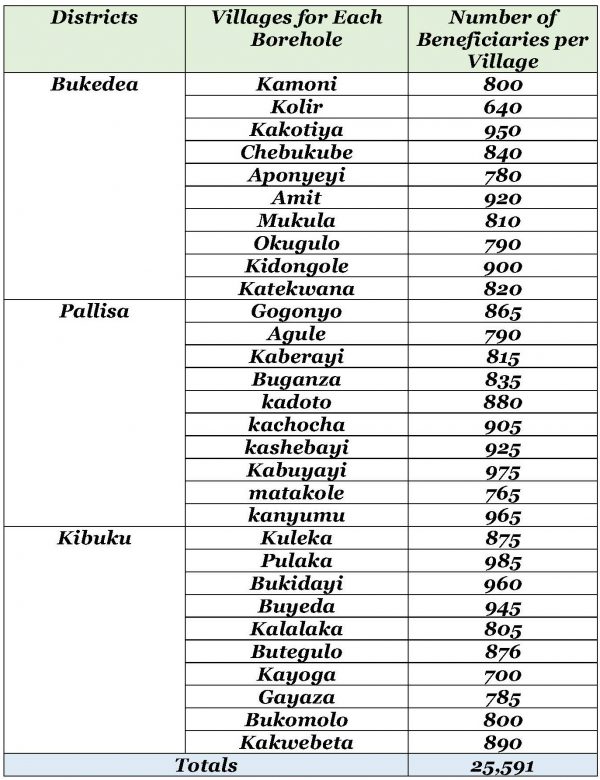
FINANCIAL BREAKDOWN
Your donation of USD $19,935 is broken down as follows:
The cost of digging one well and installing a hand pump was
$1,200, with all nine coming to $10,800. This means that the provision of clean, drinking water to a family through hand dug wells on average came to $8.44!
The average cost of the repair and maintenance of each borehole came to $250, with the total cost of all 30 being $7,500. As an analysis, this means that access to clean water for an individual residing in one of these villages cost less than $0.30!
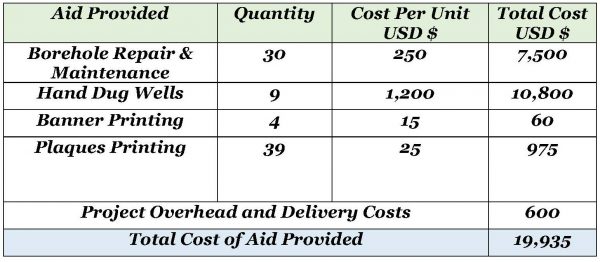
The table above provides a financial breakdown of the project’s expenditure.
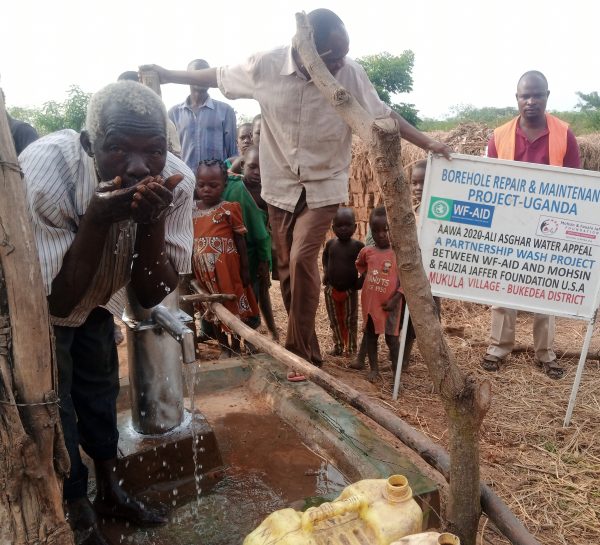
BENEFICIARY STORY
N.F’s Family
N.F from the Pallisa District narrated that before the installation of this water well, most of the households in her village were collecting their water from ungazetted water sources where wild animals also drink. She continued that precuring this water was especially during harsh weather conditions. Often these ungazetted wells dry up and women are forced to travel great distances for water.
She added that they would spend the little money they had on treating typhoid disease, caused by contaminated water. Children get ill and pregnant mothers sometimes get miscarriages due to water borne diseases.
She expressed that she is very grateful to have this water well as it has provided her as well as the children in her village with access to clean water.
Women have started getting water for their gardens and have time to engage in other activities like poultry farming. The time for precuring water has reduced significantly from 5 hours to 20 minutes.
SUMMARY
Your generous contribution of USD $19,935 funded the construction of 9 hand dug wells and the repair of 30 boreholes across 3 districts in Eastern Uganda.
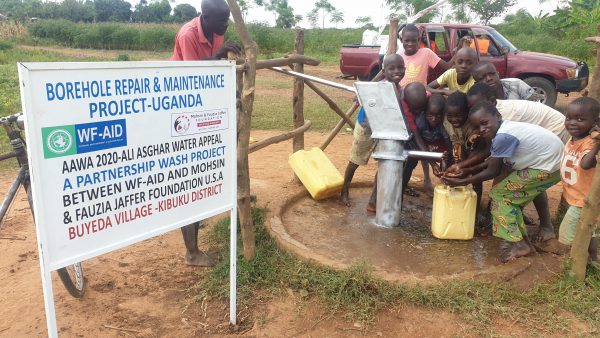

Tanzania
TANZANIA
LOCATION & BACKGROUND
4 million people in Tanzania lack access to an improved source of safe water, and 29 million don’t have access to improved sanitation. People living under these circumstances, particularly women and girls, spend a significant amount of time traveling long distances to collect water.
In Tanzania and around the world, people are navigating the COVID-19 pandemic, and millions are striving to endure this crisis with an added challenge. They lack access to life’s most critical resource – water.
This project delivered 25 deep wells and 25 shallow wells across 20 villages within 7 deprived and impoverished districts in Tanzania.
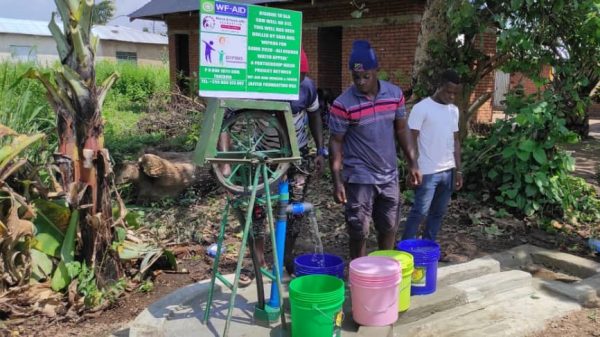
BENEFICIARIES
Your donation provided access of clean water to a total 0f 80,857 beneficiaries. The table below provides a breakdown of the beneficiaries from the wells constructed across Tanzania:
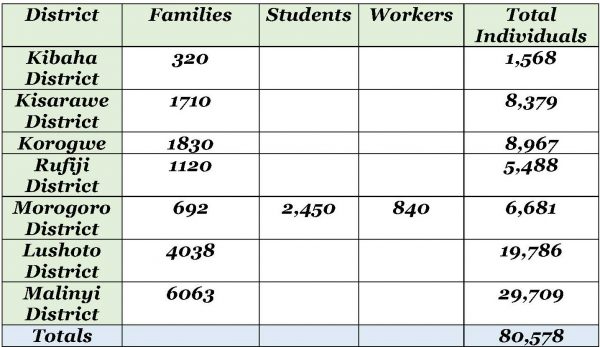
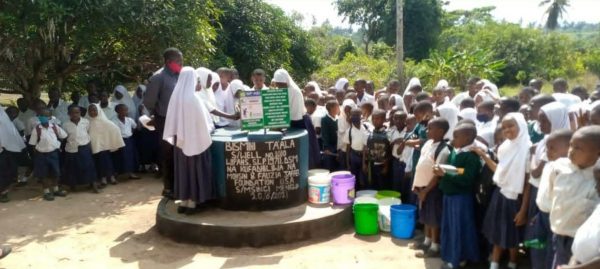
PROJECT AIMS & IMPACT
This project aimed to alleviate the lack of access to clean drinking water across 20 locations in Tanzania. providing these deprived communities with something as basic as access to clean water, we are providing life- changing aid. This access to clean water decreases water borne diseases, improves hygiene and frees up time for many children and women who would have otherwise been forced to travel great distances to precure water.
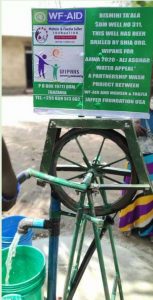
FINANCIAL BREAKDOWN
Your donation of USD $106,250 changed the lives of 80,578 beneficiaries across 40 locations by providing them with access to clean water through 50 water wells (25 SDM and 25 Shallow Wells).
The table below provides a financial breakdown of the project’s expenditure.

TESTIMONIALS
An SDM well was built in the Mtaa Wa Zahanati area of Morogoro region of Malinyi District, of Malinyi ward which is approximately about 590 km away from Dar es Salaam where access to clean water was a serious problem.
Villagers had to travel long distance in order to obtain water for drinking and domestic use. We were able build an SDM water well enabling the villagers to get access to clean water for drinking and domestic use.
Having source of clean water supply has proved to be a great blessing as they no longer have to travel miles looking for clean water and utilize their time in earning their living. Around 321 families have benefited from the water well.
An SDM well was built in the Mtaa Wa Zahanati area of Morogoro region of Malinyi District, of Malinyi ward which is approximately about 590 km away from Dar es Salaam where access to clean water was a serious problem.
Villagers had to travel long distance in order to obtain water for drinking and domestic use. We were able build an SDM water well enabling the villagers to get access to clean water for drinking and domestic use.
Having source of clean water supply has proved to be a great blessing as they no longer have to travel miles looking for clean water and utilize their time in earning their living. Around 321 families have benefited from the water well.
SUMMARY
Your donation funded four Ali Asghar Water Appeal projects:
- The installation of one water irrigation system in Afghanistan.
- The construction of 12 washrooms, 4 submersible deep wells, and 11 hand pump shallow wells in India.
- The repair of 30 boreholes and the construction of 9 water wells across Uganda.
- The construction of 25 deep wells and 25 shallow wells across Tanzania.
The remaining funds of USD $158 has been allocated towards other sustainable water projects.
